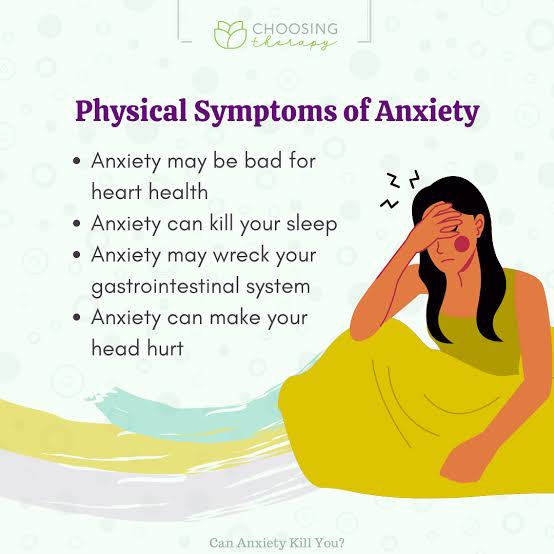Do you know what the impact of anxiety on your body and your life? Everyone feels anxious from time to time, but chronic anxiety can significantly interfere with your quality of life. Although anxiety may be best known for behavioral changes, it can also have serious consequences for your physical health.
What are the types of anxiety disorders?
Anxiety is a normal part of human life. Some people may feel anxious before addressing a group at work, for example, or even at university or school. In the short term, anxiety increases breathing and heart rate and focuses blood flow to your brain where it needs to be. This physical response prepares you to face difficult situations.
Anxiety and stress disorders can occur at any stage of life. But it usually begins in middle age, and women are often more likely than men to develop anxiety disorders. This is according to the National Institute of Mental Health in the United States of America. There are several types of anxiety disorders that affect humans, including the following:
1- generalized anxiety disorder
People with generalized anxiety disorder experience excessive anxiety without any rationale. Studies show that this type of anxiety affects millions of people around the world every year. Generalized anxiety disorder is diagnosed when you continue to feel intensely anxious about a variety of things for six months or longer. If you have a mild case of this disorder, you will likely go about your normal daily activities as normal. While severe cases may be affected more.
2- Social Anxiety Disorder
This type of anxiety involves an intense fear of social situations and of others being judged or humiliated intolerable. This severe social fear or phobia may make a person feel more shy and alone.
The American Anxiety and Depression Association reports that about 15 million Americans suffer from social anxiety disorder. Which appears around the age of 13. The severity of the disorder varies from person to person, as some may experience loneliness and isolation. Others may find it difficult to interact with others.
3- Post-traumatic stress disorder
PTSD develops after witnessing or experiencing something traumatic. Symptoms can begin immediately and may be delayed for years. Common causes of this disorder include: war, natural disaster, or physical attack. PTSD symptoms may appear immediately without any warning.
4- Obsessive-compulsive disorder
People with obsessive-compulsive disorder may feel a strong urge to repeat certain rituals many times, and may experience some unwanted and disturbing intrusive thoughts (this is known as obsessiveness).
Common symptoms of this disorder include: washing hands frequently, checking things several times, concerns about hygiene and the need for coordination, and an intense fear of aggressive attacks.
Phobias
This type of anxiety includes fear of confined spaces (claustrophobia) or fear of heights (acrophobia) and many other different types of phobias. This phobia causes you to develop a strong impulse to avoid the object or situation that is frightening to you.
6- panic disorder
This disorder causes panic attacks and a general feeling of anxiety, dread, or even imminent death. Physical symptoms include heart palpitations, chest pain, and shortness of breath. These attacks may occur at any time, and panic disorder may also accompany another type of anxiety disorder.
What is the effect of anxiety on the body?
Different anxiety disorders affect many systems of the body, and the state of the body is affected by the anxiety disorder that affects the body, and the effect of anxiety on the body includes the following:
1- Effects on the central nervous system
Long-term anxiety and panic attacks can cause your brain to release stress hormones on a regular basis. It can increase the frequency of some symptoms such as headache, dizziness and depression. When you feel anxious and stressed, the brain feeds your nervous system with hormones and chemicals that help the body respond to that feeling, such as adrenaline and cortisol.
Although long-term exposure to these hormones may be beneficial in some cases of sudden severe stress, it can be more harmful to human physical health in the long term as well, for example, long-term exposure to cortisol may cause weight gain.
2- Effect on the heart and blood vessels
Anxiety disorders can cause an increased heart rate, heart palpitations, and some chest pain. It also makes you more susceptible to high blood pressure and heart disease. If you already have heart disease. This may increase the risk of heart attacks and strokes.
3- Effect on the digestive system
Anxiety also clearly affects the digestive system in the human body, as sufferers suffer from stomach pain, nausea, diarrhea and other problems in the digestive system. Studies also confirm that there is a relationship between anxiety disorders and irritable bowel syndrome, which causes vomiting, diarrhea or constipation.
4- Influence on the immune system
Anxiety can increase certain chemicals and hormones in your body, such as adrenaline. In the short term, this increase leads to an increase in heart rate and breathing so that the brain can get more oxygen so that it is equipped to deal with difficult situations. Your immune system may be affected when exposed to anxiety. But your body may return to its normal functions when the anxiety is completely eliminated.
But if you frequently feel anxious or have seizures for long periods of time, your immune system will not improve and may weaken. This makes you more likely to contract some diseases such as bacterial and viral infections.
5- Effect on the respiratory system
Anxiety causes your breathing rate to increase, and if you have chronic obstructive pulmonary disease (COPD) you may be more prone to episodes of weak breathing. Try to avoid anxiety as much as possible if you have a chronic respiratory disease.
If you suffer from an anxiety disorder, it is best to consult a specialist doctor to help get rid of this disorder and avoid its negative effects. Avoid things and things that may make you vulnerable to anxiety and stress.

